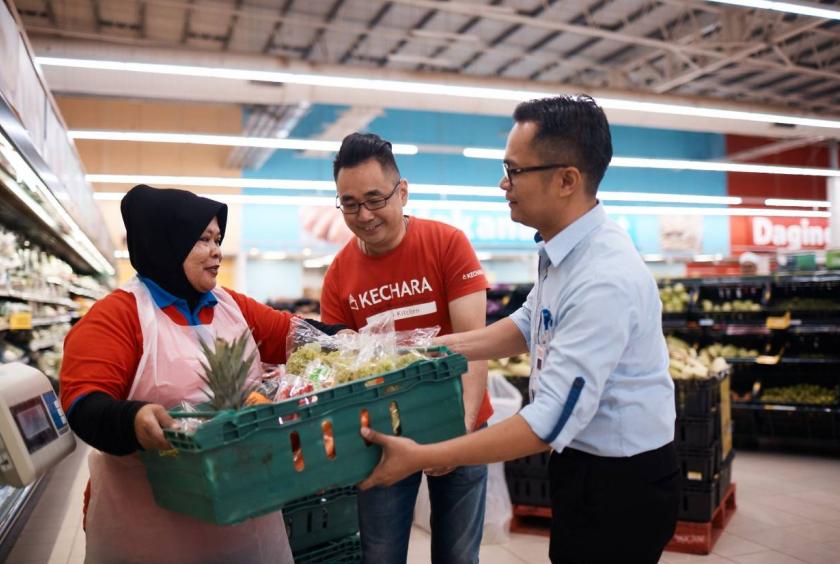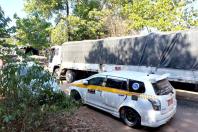
TESCO Stores (Malaysia) Sdn Bhd is taking a firm stance against the global issue that is food waste by becoming the first retailer in Malaysia to publish its food waste data.
Up to this point, Malaysia food waste data is mostly derived from household food waste which is estimated at some 16,688 tonnes daily, according to a report by the Khazanah Research Institute (KRI).
This amounts to a whopping 6.1 million tonnes of food waste a year, just by Malaysian households.
KRI also noted that the amount of food discarded by Malaysian households daily is enough to feed 2.2 million people three meals a day.
In its Food Waste Management Development Plan for Industry, Commercial and Institution Sector (2016-2026) report, the Solid Waste Management and Public Cleansing Corporation said that the household sector generates about 44.5% of food waste, while Industrial, Commercial and Institution (ICI) generates about 31.4%.
However, data for ICI is undetermined as up until this commitment from Tesco Malaysia, no other organisations has voluntarily provided its food waste data.
“As a retailer we know that perfectly matching supply and demand is particularly challenging leading to some unsold surplus food. Therefore, transparency and measurement are essential for identifying hotspots and in tackling the causes of food waste, because what gets measured gets managed, ” said Tesco Malaysia chief executive officer Paul Ritchie.
Tesco Malaysia’s journey in reducing food waste has begun long before it become the first local retailer to publish its food waste data.
Back in October 2016, Tesco Malaysia began collaborating with Food Aid Foundation and Kechara Soup Kitchen where it donated unsold but edible fruits, vegetables and bakery surplus daily.
What started out as a small-scale project that only involves two stores have now expanded to 59 Tesco stores across Malaysia.
The total number of meals made up of unsold but edible foods donated since October 2016 through this collaboration is at 4.8 million meals.
For the financial year ending Feb 28,2019, Tesco donated 610 tonnes of unsold but edible food which is equivalent to 1.4 million meals.
In 2017, Tesco partnered with MYSaveFood Network, a network initiated by the Malaysian Agricultural Research and Development Institute (Mardi) to begin the Edible Garden Programme with 26 of Tesco’s Adopted Schools.
The programme is part of Tesco’s education and environmental corporate social responsibility where school children are taught the importance of growing their own vegetables, herbs and fruits as well as reducing food waste by composting remaining inedible foods.
Initiatives were also created to help reduce food waste in Tesco’s operations which include the introduction of food surplus donation guidelines to all stores on process to donate to food banks.
Tesco has also improved the fresh produce packaging to reduce damage including for prepacked chicken and select leafy vegetables.
“Given all the work we have undertaken, publishing our food waste data is just the next logical step in our journey in creating a more sustainable and environmentally friendly Malaysia, ” said Ritchie.
MYSaveFood Network secretariat head Dr Ainu Husna M.S. Suhaimi lauds Tesco's initiative in publishing its food waste data.
“In the fight to reduce food loss and waste data is key. Knowing how much is wasted will create the awareness and enable us to take the necessary action to reduce it. It takes a concerted effort to measure and reduce food loss and waste throughout the supply chain and Tesco’s move complements Mardi's initiative in measuring food loss and waste at the farm level, ” she said.
“As a network, MYSaveFood hopes more partners and organisations will follow Tesco’s lead to know and acknowledge where waste happens in their operations for actions to be taken. Only then, as a nation we will be able to achieve global goals to reduce food loss and waste by half in 2030.”
WWF-Malaysia Conservation Director Dr Henry Chan believes that this will be the way for corporates going forward.
“If food loss and waste was a country, it would be the third largest emitter of greenhouse gases. Failing to tackle our wastage makes it extremely difficult to keep climate change from causing catastrophic impacts, ” Dr Chan said.
“We want to see a world in which food's true value is recognised and wastage is dramatically reduced to end hunger, cater for a growing global population and reduce the pressure on our planet. Having this kind of data from a retailer with such a wide reach such as Tesco will be most beneficial towards this fight for a sustainable future.”
Six years ago, Tesco United Kingdom set an ambitious target to help halve food waste from farm to fork by 2030 to help meet the United Nations Sustainable Development Goal 12.3 of halving food waste and loss.
Tesco Malaysia’s food waste data publication is an important addition towards this overall goal.









